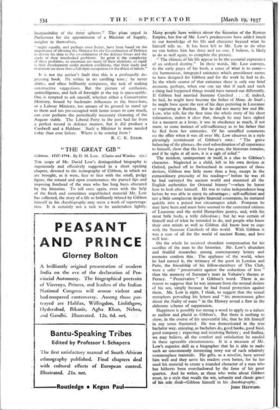"THE GREAT GIB"
Gibbon. 1737-1794. By D. M. Low. (Chatto and Windus. 15s.) THE scope of Mr. David Low's distinguished biography is ingeniously and effectively suggested in a short opening chapter, devoted to the iconography of Gibbon, in which we are brought, as it were, face to face with the small, podgy figure, the rotund and open countenance, the pursed lips and imposing forehead of the man who has long been obscured by the historian. To tell once again, even with the help of the fresh and sometimes unpublished material Mr. Low -has collected, the storynf a life so -.brilliantly ilated by Gibbon himself in his Autobiography may seem a work of Supereroga- tion. It is certainly not a task to be undertaken lightly. -Many..peofileve—wiirtien'-abOut-the Ristorian of the- Roman Empire, but few of Mr. Low's predecessors have added Much to our knowledge of his life and character beyond what he himself tells us. It has been left to Mr. Low to do what no one before him has done and no one, I believe, is likely to do as well again, to complete the picture.
"'The -chin 'cits .Of his life appear to be the essential expression
of an ordered destiny." In these words, Mr. Low conveys, in the early pages of his book, a sense of what is to come— the harmonious, integrated existence which providence seems to have designed for Gibbon and for the work he had to do. In the whole course of that existence there is only one brief moment, perhaps, when one can say that if such and such a thing had happened things would have turned out differently. If Gibbon had married Suzanne Curchod . . . if, indeed, he had, he might have become the father of Mme. de Stael ; he might have spent the rest of his days pottering in Lausanne or vegetating at Buriton. But he did not marry her and Mr. Low, who tells for the first time the whole story of his short infatuation, makes it clear that, though he may have sighed • for a moment as a lover, it was in obedience as much, if not more, to some instinct. of self-sufficiency as to his father that he fled from her entreaties. Of his unruffled comments on the affair when it was all over Mr. Low observes in a style pleasingly reminiscent of Gibbon's own: "The grave balancing of the phrases, the cool subordination of all experience to himself, show that the lover has gone, the historian remains, and if he sighs at all now, it is a sigh of relief."
The incident, unimportant in itself, is a clue to Gibbon's character. Neglected as a child, left to his own devices at Oxford, packed off to Switzerland in consequence of those devices, Gibbon was little more than a boy, except in the extraordinary precocity of his reading—" before he was 16 he had surveyed the ancient world and mastered all the English authorities for Oriental history "—when he learnt how to look after himself. He was to value independence long before he was able to enjoy its advantages ; self-sufficient and not a little complacent despite financial constraints, he matured quickly into a poised but circumspect adult. Pompous he may have been and must have seemed to the contented citizens of Lausanne and the stolid Hampshire gentry, and, with his stout little body, a trifle ridiculous ; but he was certain of himself and of what he intended to do, and people who know their own minds as well as Gibbon did know how to cope with the Suzanne Curchods of this world. With Gibbon it was a case of all for the. world of ancient Rome, and love well lost.
On the whole he received abundant compensation for his sacrifice of the man to the historian. Mr. Low's abundant and fruitful researches among contemporary letters and memoirs confirm this. The applause of the world, when he had earned it, the intimacy of the great in London and Paris, the friendship -of his fellow-members of The Club, were a safer "preservative against the seductions of love" than the memory of Suzanne's tears in Voltaire's theatre at Femey. " Preservative " is Gibbon's word. There is . no reason to suppose that he was immune from the normal desires of his sex, simply because he had found protection against them. Mr. Low is right, I think, to suggest that the sexual metaphors pervading his letters and "his monotonous gibes about the frailty of nuns" in the History reveal a flaw in the elaborate scheme of suppression.
Happiness is possibly too strong a word to apply to a nature as mellow and_ placid as Gibbon's. But there is nothing to show, in the course of his uneventful life, that he felt himself in any sense frustrated. He was domesticated in the true bachelor way, enjoying, as bachelors do, good books, good food, good company ; expecting and 'reeeivinglatiery ; and finding, we may believe, all the comfort and satisfaction he needed in these agreeable circumstances. It is a measure of Mr. Low's superior skill as a biographer that he is able to make such an uncommonly interesting story out of such relatively commonplace Materials. His gifts, as a novelist, have served him well and they serve his readers even better, for he has used his material to create a rounded character of a man who has hitherto been overshadowed by the fame of his great quartos. And he writes, as those who write about Gibbon must, in a style that recalls the wit, urbanity and classic grace if his ISolç riva1-+Gibbon himself in his Autobiography.
join? HAYWARD.




































































 Previous page
Previous page